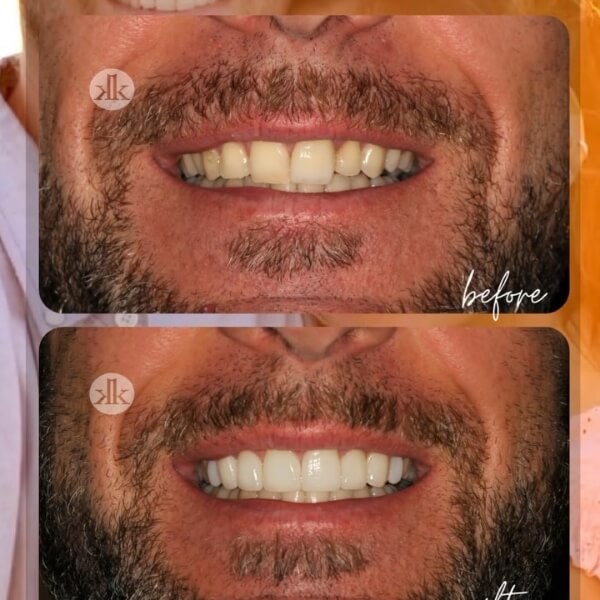
Root Canal Therapy in San Diego, CA
In general, root canal therapy has a negative reputation for being a painful and intimidating procedure. However, statements and ideas such as these are mostly the result of rumors. While root canal therapy is a more invasive procedure, the technique itself does not cause more or less pain than any other restorative or cosmetic treatment performed.
At La Jolla Cosmetic Dentistry & Orthodontics in San Diego, CA, our modern and technologically advanced dentistry allows patients to receive root canal therapy in a comfortable environment.
We offer sedation dentistry and state-of-the-art techniques to ensure a safe, relaxing dental experience.
Dr. Kohani takes care to ensure that all patients are completely at ease before, during, and after all procedures. He provides a comprehensive treatment plan, and any questions or concerns you may have can be discussed during your consultation before treatment.
“At our practice, we do not cut corners. We only use the most advanced, cutting-edge equipment available.”rn— Dr. Kohani
-
Consultation
Dr. Kohani believes that saving the natural tooth will benefit your oral health the most. With this conservative approach to dentistry, he can provide treatment that works with your tooth structure to create a smile that is true to your specific needs and cosmetic goals.
Dr. Kohani will take X-rays of the tooth using a 3D digital CT scan and locate the infection, at which point he will determine whether endodontic treatment is the right method for saving your tooth. Tooth extractions are also an option when preserving the health of your teeth and jaw, but they can also be costly and need to be replaced with a dental implant or bridge to restore functionality. If possible, depending on the extent of your infection, it is always best to save the natural tooth structure.
-
Endodontic Treatment
A root canal treatment specifically targets the infected pulp in the tooth and works to remove it from the mouth. Before the procedure is performed, Dr. Kohani will use a local anesthetic to numb the area. A sheet made of rubber, known as a dental dam, protects the mouth during treatment and also keeps bacteria away from the tooth receiving root canal therapy.
Once the feeling is lost in the tooth, Dr. Kohani will create a small hole in the crown to access the pulp below. The dental pulp is carefully extracted from the tooth, the infection is wiped clean and disinfected, and the root canal walls are reshaped. The root canals are then replaced with gutta-percha, a biocompatible material similar in consistency to rubber. Dr. Kohani will then seal the root canals and replace your natural tooth enamel with a ceramic crown. Afterward, your tooth will be restored to its full function with the same inherent qualities as before.
-
Recovery and Results
As the anesthetic effects wear off, you will likely experience some sensitivity around your newly restored tooth, especially if you felt pain before your procedure. Cold compresses work to alleviate discomfort, and over-the-counter pain medications can relieve your soreness.
Any pain or soreness should subside within a week of undergoing your root canal. However, if the pain persists, please contact Dr. Kohani for a follow-up appointment.
You may also notice that your restored tooth feels different than your natural teeth because a ceramic restoration has partially or entirely replaced your natural tooth enamel. Although it may take some time to get used to the new surface, your replacement should act just like your natural teeth and even have improved function since having the discomfort of the infection eliminated.
Video: Patient Testimonial
Testimonials
Our patients LOVE us, and you will too!
Amazing staff! DR. kohani is the man! 10/10 recommend this dentistry. Make you feel like a valued patient and will go above and beyond for you.
I’ve been a patient of Dr. Kohani’s for over 10 years. He and his staff are hands down the best! They have always been friendly and welcoming every time I’ve come in. The dentist can be a place that no one wants to go to but I’ve weirdly enjoyed every single one of my visits.
I have been a dental client of this office for 15 years and I LOVE my dentist and the cleaning technicians. Dr. Kohani is simply great and helpful!!!
Frequently Asked Questions
Is root canal therapy right for me?
If you experience tooth sensitivity, tenderness, pain associated with cold or hot temperatures, or discoloration, then you may need a root canal treatment. An appointment with Dr. Kohani is necessary to evaluate your dentition and diagnose the cause of your symptoms.
How long does root canal therapy take to perform?
Depending on the extent of correction being made, a root canal can take between one and two hours to complete. Most root canal treatments can be finished in one visit, while others may require a second visit.
How much does root canal therapy cost in La Jolla?
Some insurance companies partially cover root canal therapy, so please contact your provider and discuss what your coverage plan includes. Your pricing will be discussed during your consultation, and a treatment plan will be established.
If I don’t feel tooth pain, why do I need root canal therapy?
For some patients, pain does not present itself when the tooth becomes infected. This does not mean that the infection is not present or that it went away; different bodies react in various ways to infections. After an assessment of your teeth and gums, it may be determined necessary for you to receive root canal therapy to avoid future concerns from developing.
How long does root canal therapy last?
With adequate oral hygiene, your root canal treatment can be long lasting. If cracks, decay, fractures, or other problems are avoided, then the tooth can remain healthy for many years after your treatment with proper oral care. Daily brushing and flossing can maintain healthy teeth and prevent the need for future root canal treatments.
Do You Have More Questions?
To learn more about root canal therapy, cosmetic dentistry services, general dental services, or tooth replacement, please schedule your personal consultation today. Our La Jolla Cosmetic Dentistry & Orthodontics office is located in San Diego near La Jolla and Universal City. We encourage you to fill out our online contact form or call our office at (858) 295-0603 for more information about our services.
Patient Portal Login













